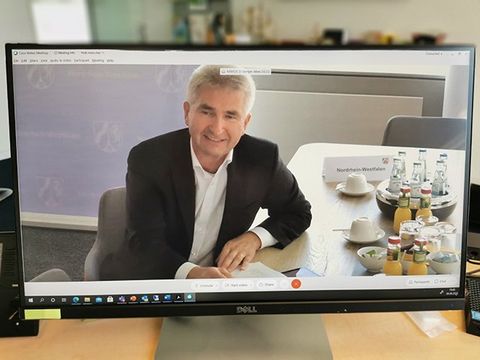High-Level-Event 2020
On Wednesday 9 September, an online event with the participation of the three competent ministers outlined the priorities of the project. Minister Wiebes: “Our region has everything to be the best in the field of innovations for green energy and a circular economy. Several initiatives have already started, but the industry’s continued commitment will be key to a successful transition. We need to continue supporting that, which requires good cooperation between our three governments and between government and industry.”
Ms. Hilde Crevits, Vice-Minister-President of the Government of Flanders, Flemish Minister
for Economy, Innovation, Work, Social economy and Agriculture
Minister Crevits said: “The transition to a sustainable Flemish economy requires specific focus on the strategically important chemical sector. This unique collaboration between Flanders, The Netherlands and North Rhine-Westphalia should be the engine for a successful climate transition in Europe. This region in particular could be a European test area for industrial transition in the chemical industry, where we implement innovations for the first time in real-life conditions for the first time, working together with academics, industry and governments.”
Minister Pinkwart commented on the speed of innovation, saying: “Approvals of company investments and government support have to go faster. The example of Tesla building a factory for electric cars in Brandenburg shows what is possible in 12 months.”
Prof. Dr. Andreas Pinkwart, Minister for Economic Affairs, Innovation, Digitalization and
Energy of the State of North Rhine-Westphalia
Infrastructure for a climate-neutral and circular economy
Pipelines are especially important to enable the transition to climate neutrality. However, the further development of a cross-border and modern pipeline network for the transport of LPG, propylene, CO2 or hydrogen for example, requires substantial investments and often encounters complex planning and approval procedures. The trilateral strategy brought together eight major chemical companies and the ports of Antwerp and Rotterdam on a Letter of Intent (LoI) on future pipeline infrastructure in the region. As preconditions for the implementation of a joint pipeline project the LoI parties identified an intensified cross-border cooperation, a reduced realization time and political support.
Innovation for a climate-neutral and circular economy
In terms of innovation, the chemical industry supplies the essential materials and techniques with which our economy and society can achieve significant environmental and climate gains. Inventing, scaling up and deploying the technologies to radically reform the industrial production processes within a time span of a few decades is a big challenge, and speed is thus essential when innovating. The trilateral innovation consortia have been formed on the basis of industry inputs on their needs and are industry-led. By cooperating in these consortia, the challenge becomes better manageable, but two things remain essential to deliver the innovations in time: public-private investments in risky pilot installations and demonstration plants and more innovative start-ups and scale-ups in sustainable chemistry.
The trilateral strategy for the chemical industry has also resulted in a leading international collaboration project with the "Cracker of the Future" consortium. In it, six chemical companies are jointly investigating the possibility of running cracker installations - where the essential basic molecules for the chemical industry are produced - on renewable electricity instead of fossil fuels. Work is currently ongoing on the topic of the use of hydrogen in the future.
Energy for a climate-neutral and circular economy
The trilateral strategy for the chemical industry also puts forward two crucial recommendations to better fit energy policy into the objectives of a circular and climate neutral economy. Promising technologies such as the capture of CO2 for storage (CCS, Carbon Capture & Storage) or reuse (CCU, Carbon Capture & Utilization) are still too much held back by European regulations. The current revision of the EU’s emissions trading system (ETS) presents an opportunity create a level playing-field for industry investments in innovations that are aligned with the circular economy.
In addition, the availability of abundant, secure and competitive low carbon energy is of key importance to succeed the climate transition. Therefore, a strategy on how to provide and import sufficient low carbon energy at competitive prices for the European society will be a key question.




